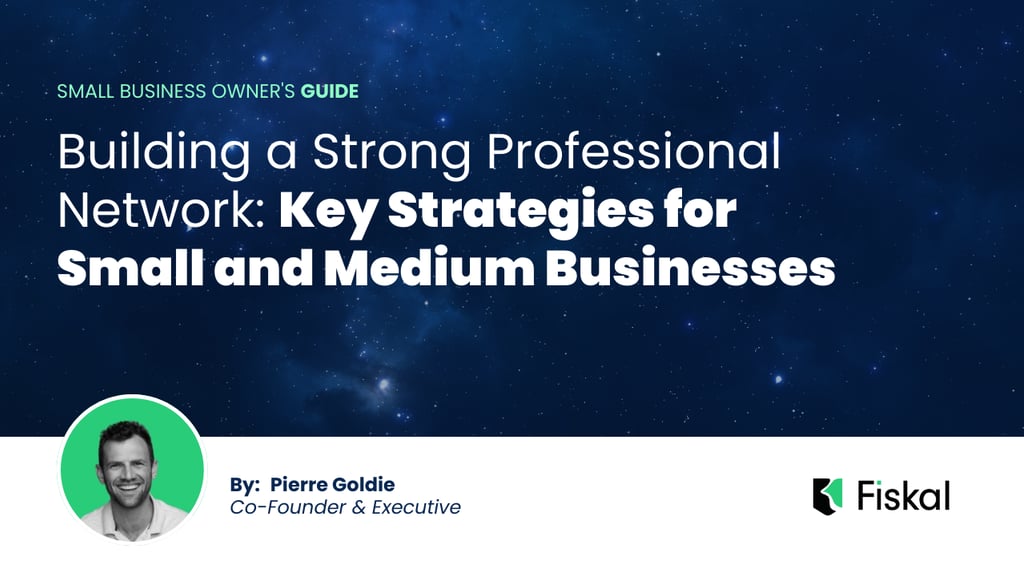Building a Strong Professional Network: Key Strategies for Small and Medium Businesses
Networking is the lifeblood of any business, particularly for small and medium-sized businesses (SMBs) striving to grow and thrive in competitive markets. In today’s interconnected world, building a strong professional network is more crucial than ever. It not only opens doors to new opportunities but also provides the support, resources and partnerships necessary to scale your business effectively. This blog post explores the strategies you can employ to meet potential professional partners and expand your network, which is critical for the growth of your SMB.
SYSTEMS AND SOFTWARE


Why Networking Matters for SMBs
For SMBs, networking is about more than just making connections; it’s about building relationships that can lead to valuable collaborations, mentorship opportunities and even potential customers. A robust network can provide:
Access to Resources: Whether it’s capital, expertise or advice, having a network means having access to resources that can help you overcome challenges and seize opportunities.
Opportunities for Collaboration: Partnerships with other businesses can lead to joint ventures, co-marketing opportunities and shared growth strategies.
Increased Visibility: Networking increases your business's visibility within your industry, leading to more opportunities for growth and expansion.
Support System: A network of professionals provides a support system that can offer advice, encouragement and guidance as you navigate the complexities of growing your business.
Strategies for Effective Networking
1. Identify Your Networking Goals
Before you dive into networking, it’s important to identify what you want to achieve. Are you looking for mentors, potential partners, customers or industry insights? Understanding your goals will help you focus your efforts and approach networking with a clear purpose. This targeted approach will make your networking more effective and meaningful.
2. Leverage Online Platforms
The digital age has transformed networking, making it easier to connect with professionals across the globe. Platforms like LinkedIn, Twitter and industry-specific forums are excellent places to start. Here’s how you can leverage these platforms:
LinkedIn: Optimize your LinkedIn profile to reflect your business and professional expertise. Join industry groups, participate in discussions and connect with professionals who share similar interests or could provide valuable insights.
Twitter: Engage with thought leaders, participate in industry conversations, and share your own insights. Twitter chats can also be a great way to connect with others in your industry.
Industry Forums: Participate in online forums and communities where professionals in your industry gather. These platforms provide opportunities to ask questions, share knowledge and establish yourself as a thought leader.
3. Attend Industry Events
In-person events remain a powerful way to build relationships. Conferences, trade shows, seminars and networking events provide opportunities to meet professionals in your industry face-to-face. When attending these events, keep the following tips in mind:
Be Prepared: Research the event, its speakers and attendees. Know who you want to meet and what you want to achieve.
Have Your Elevator Pitch Ready: Be prepared to introduce yourself and your business succinctly. Your elevator pitch should clearly convey what you do and what you’re looking for.
Follow Up: After the event, follow up with the people you met. Send a personalized message or connect on LinkedIn to keep the conversation going.
4. Join Professional Associations and Groups
Professional associations and groups are excellent avenues for meeting like-minded individuals and potential partners. These groups often host networking events, workshops and webinars that can help you expand your network. Consider the following:
Local Chambers of Commerce: Joining your local chamber of commerce can provide access to networking events, business resources and potential partners in your community.
Industry-Specific Associations: Membership in industry-specific associations gives you access to a network of professionals who understand the unique challenges and opportunities in your field.
Online Groups: Platforms like LinkedIn and Facebook host groups for nearly every industry. Joining these groups allows you to connect with professionals, participate in discussions and share your expertise.
5. Cultivate Relationships
Networking is not just about collecting business cards or LinkedIn connections; it’s about cultivating meaningful relationships. Building trust and rapport takes time, but it’s essential for long-term success. Here’s how you can cultivate strong professional relationships:
Provide Value: Offer help, share resources, or introduce people to others in your network. Providing value builds goodwill and strengthens relationships.
Stay in Touch: Regularly check in with your connections. Whether it’s through a quick email, a comment on their LinkedIn post, or a casual coffee meeting, staying in touch keeps you on their radar.
Be Genuine: Authenticity is key to building lasting relationships. Be yourself, show genuine interest in others and avoid coming across as overly transactional.
6. Seek Out Mentors and Advisors
Mentors and advisors can play a crucial role in your professional development and business growth. They provide guidance, share their experiences and help you navigate challenges. When seeking out mentors, consider the following:
Identify Your Needs: Determine what areas you need help with, whether it’s strategic planning, marketing or financial management. This will help you identify the right mentor.
Look Within Your Network: Start by looking for mentors within your existing network. Reach out to individuals you admire or who have the experience you’re looking for.
Be Open to Learning: Approach the mentorship relationship with an open mind and a willingness to learn. Be receptive to feedback and be proactive in seeking advice.
7. Collaborate with Other Businesses
Collaborations with other businesses can be mutually beneficial and lead to significant growth opportunities. Whether it’s co-hosting an event, partnering on a project or cross-promoting each other’s products, collaboration can help you reach new audiences and expand your network. To find potential collaborators:
Attend Networking Events: Meet other business owners and explore potential collaboration opportunities.
Engage on Social Media: Engage with businesses on social media platforms. Comment on their posts, share their content, and start conversations that could lead to collaborations.
Propose Win-Win Opportunities: When approaching potential collaborators, propose ideas that offer mutual benefits. Show how the collaboration can help both businesses achieve their goals.
8. Invest in Your Personal Brand
Your personal brand is a reflection of your expertise, values and what you bring to the table. A strong personal brand can make you more attractive to potential partners and connections. Here’s how to build and maintain a strong personal brand:
Share Your Knowledge: Write blog posts, contribute to industry publications or speak at events. Sharing your knowledge positions you as a thought leader in your field.
Be Consistent: Ensure that your personal brand is consistent across all platforms, from your social media profiles to your business website.
Network with a Purpose: When networking, focus on building relationships that align with your personal brand and professional goals.
Conclusion
Networking is an essential part of growing your SMB. By strategically building and nurturing your professional network, you open the door to new opportunities, collaborations and resources that can drive your business forward. Whether you’re attending industry events, leveraging online platforms or cultivating relationships with mentors and advisors, the key is to approach networking with a clear purpose and a genuine desire to build meaningful connections. As your network grows, so too will the opportunities for your business to thrive in today’s competitive landscape.












